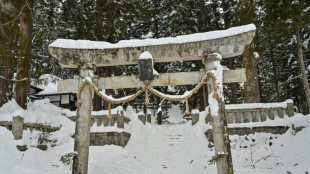
-
 Macron to present Trump with 'proposals' on peace in Ukraine
Macron to present Trump with 'proposals' on peace in Ukraine
-
Zelensky hails Ukraine's 'heroism' on third annniversary of Russia's invasion

-
 Cavs hold off Grizzlies for seventh straight NBA win
Cavs hold off Grizzlies for seventh straight NBA win
-
China's Alibaba to invest $50 bn in AI, cloud computing

-
 Vatican thriller 'Conclave' wins top prize in SAG Awards upset
Vatican thriller 'Conclave' wins top prize in SAG Awards upset
-
Dominant Ducati unleash deposed MotoGP kings Marquez and Bagnaia

-
 Premier League champions-elect Liverpool leave mark on Man City
Premier League champions-elect Liverpool leave mark on Man City
-
Indonesia launches new multi-billion-dollar sovereign wealth fund

-
 South Korean fans soak up nostalgia with vintage Japanese superheroes
South Korean fans soak up nostalgia with vintage Japanese superheroes
-
Most Asian markets track Wall St loss; Hong Kong extends gains

-
 German vote winner Merz faces tough talks to build govt
German vote winner Merz faces tough talks to build govt
-
Japan warns of avalanches, icy roads ahead of more snow

-
 All Black Caleb Clarke admits dangerous driving: NZ media
All Black Caleb Clarke admits dangerous driving: NZ media
-
Debutants San Diego stun Galaxy with win in Los Angeles

-
 India's Modi uses mega Hindu festival to burnish credentials
India's Modi uses mega Hindu festival to burnish credentials
-
Surprise rebel alliance could give Sudan's beleaguered RSF a boost

-
 Three years after Russia invasion, UN faces difficult votes on Ukraine
Three years after Russia invasion, UN faces difficult votes on Ukraine
-
German 'rust belt' town spotlights growing appeal of the far right

-
 Campbell downs Potgieter in playoff for first PGA Tour title in Mexico
Campbell downs Potgieter in playoff for first PGA Tour title in Mexico
-
USA and Japan win to set up SheBelieves Cup decider

-
 Most USAID workers to be fired or placed on leave
Most USAID workers to be fired or placed on leave
-
Hakimi scores twice as PSG sink Lyon to stay unbeaten in Ligue 1

-
 Hat trick pulls Ovechkin closer to Gretzky's NHL goals record
Hat trick pulls Ovechkin closer to Gretzky's NHL goals record
-
Tanaka strikes again as Japan down Colombia

-
 Baker wins US indoor 60m as Kessler, Hiltz complete double
Baker wins US indoor 60m as Kessler, Hiltz complete double
-
Kane admits last-minute decision to make Bayern bench

-
 Bakers wins US indoor 60m as Kessler, Hiltz complete double
Bakers wins US indoor 60m as Kessler, Hiltz complete double
-
American Airlines flight lands in Rome after 'security' issue

-
 Dupont eyeing Six Nations showdown with Ireland after Italy rout
Dupont eyeing Six Nations showdown with Ireland after Italy rout
-
Slot wary of Premier League dangers despite 'big' Man City win

-
 Borthwick defiant after uninspired England edge Scotland
Borthwick defiant after uninspired England edge Scotland
-
Nations at odds over major UN climate science report

-
 Pakistan fans look away from India Champions Trophy 'humiliation'
Pakistan fans look away from India Champions Trophy 'humiliation'
-
Global prayers as Vatican says pope still 'critical'

-
 Pakistan's Rizwan admits Champions Trophy dream 'ended' by India
Pakistan's Rizwan admits Champions Trophy dream 'ended' by India
-
France star Dupont eyeing Six Nations showdown with Ireland after Italy destruction

-
 'We need another title', says Salah after 'special' Man City win
'We need another title', says Salah after 'special' Man City win
-
Relentless Bayern stay eight points clear

-
 Kohli shuts down 'noise' with landmark century
Kohli shuts down 'noise' with landmark century
-
Modric stunner maintains Real Madrid title charge

-
 Salah-inspired Liverpool beat Man City to open up 11-point Premier League lead
Salah-inspired Liverpool beat Man City to open up 11-point Premier League lead
-
Townsend wants England agony to inspire Scotland for Six Nations finish

-
 Eleven-try France destroy Italy to set up Six Nations showdown with Ireland
Eleven-try France destroy Italy to set up Six Nations showdown with Ireland
-
Every game 'pressure' as Bangladesh face make-or-break clash

-
 Conservatives win German vote as far-right makes record gains
Conservatives win German vote as far-right makes record gains
-
Israel ready to resume Gaza war, PM warns after truce delay

-
 'Captain America' slips but clings to N. America box office lead
'Captain America' slips but clings to N. America box office lead
-
Modric hits rocket as Real Madrid beat Girona

-
 Eleven-try France hammer Italy 73-24 in Six Nations
Eleven-try France hammer Italy 73-24 in Six Nations
-
Kohli hits ton as India push Pakistan to brink of Champions Trophy exit


India's Modi uses mega Hindu festival to burnish credentials
The quest of millions seeking salvation at the world's largest religious festival has also been a golden opportunity for Indian Prime Minister Narendra Modi to burnish Hindu nationalist credentials.
Undeterred by packed trains, sold-out hotels, stomach-churning faecal matter measurements in rivers used for ritual bathing, and two deadly stampedes that killed dozens, the Hindu faithful descended on the city of Prayagraj for the six-week-long Kumbh Mela.
They were welcomed by the ubiquitous presence of Modi on giant billboards flanked by firebrand Hindu monk Yogi Adityanath, 52, the chief minister of India's largest state of Uttar Pradesh -- and viewed by many as the prime minister's potential successor.
Both men say the millennia-old festival which ends Wednesday has been the "grandest" yet, bolstering their portrayal of themselves as stewards of Hindu resurgence and national prosperity.
Above the sea of people at sprawling campsites, loudspeakers trumpet the achievements of Modi's Bharatiya Janata Party (BJP).
That is the take-home message for many of the pilgrims, who -- at least according to eyebrow-raising figures from Adityanath's state government -- numbered more than 560 million.
"We are just thankful to Modi and Yogi for their great work," said Satendar Singh, 60, who travelled from Bihar state to bathe where Ganges and Yamuna rivers meet.
"Only they will return to power now, no one else can replace them."
- 'Kings' -
As well as Modi and Adityanath, a host of political leaders, business tycoons and Bollywood stars have made national headlines with a holy dip since the festival opened on January 13.
The festival's success was paramount for Modi and Adityanath, whose fortunes are linked to support from India's one-billion-plus Hindus and, critics say, the marginalisation of its estimated 200 million Muslim minority.
Modi, elected for his third consecutive term last year, has championed a Hindu nationalist agenda intertwining the majority religion with politics and economy.
The Kumbh Mela, held at Prayagraj every 12 years, is the biggest milestone on the Hindu calendar.
Modi, speaking before the festival, said previous governments "did not care" about the festival and pointed out that his administration "respects the culture and hence sees it as a responsibility to provide all the facilities for devotees".
The BJP has long pushed massive projects in key Hindu pilgrimage sites including Ayodhya, also in Utter Pradesh, where a grand temple was opened last year on the site where a centuries-old mosque was torn down by zealots in 1992.
Before the festival, Modi and Adityanath -- who controlled lucrative service contracts -- boasted of massive infrastructure upgrades and investments. It has cemented diehard loyalty from supporters.
"Both Modi and Yogi are doing what no other government could do for us, and I just want them to stay in power forever," said Sonu Sharma, 48, from Prayagraj.
"They are kings, and the only thing a good king wants is whatever his subjects need."
- 'Religious division' -
But many among Prayagraj's Muslim population, who make up roughly a fifth of its seven million residents, viewed the festival with deep unease.
Many still use the city's old name of Allahabad, given by a Muslim ruler more than 400 years ago, rather than the Hindu name of Prayagraj the BJP changed it to in 2018.
Critics say it was part of wider BJP efforts to smother Muslim identity.
Local political activist Mohammad Akram, 38, accused the BJP of trying to turn the ancient festival into a "tool for religious division".
Unlike earlier editions, warnings by hardline Hindu groups deterred many Muslim shopkeepers and hawkers from entering the festival grounds.
Mohammad Zahid, 52, a shopkeeper, said "99 percent of the local Muslims did not set up shops there out of fear".
He worried about the loss of the city's Muslim past.
"You can rename the city, but how can you change this cultural fabric of brotherhood which is the foundation of Allahabad?" he asked.
Preacher Syed Farooq Ahmed, 55, whose family has lived in Prayagraj for generations, said he was "saddened" because division was "not the history of Allahabad's shared cultural heritage".
Ahmed said his ancestor built their 300-year-old home and the mosque next to it, and had used the Ganges river to perform ceremonial washings before prayers.
"This river does not belong to any caste or religion," he said. "It belongs to those who have made it a part of themselves".
J.Horn--BTB
